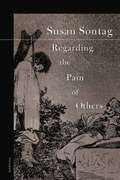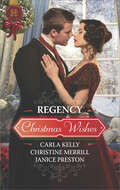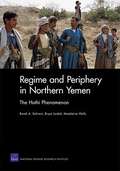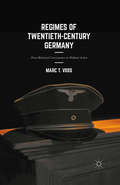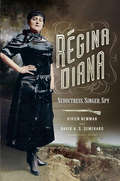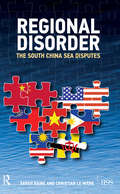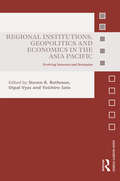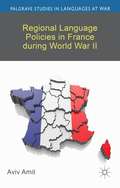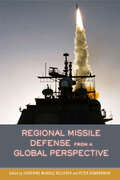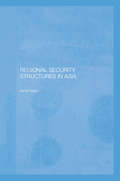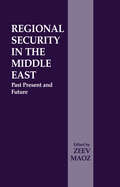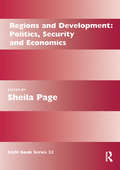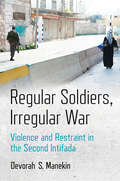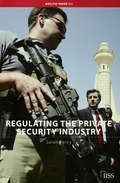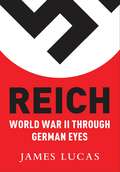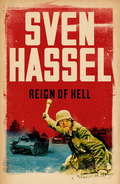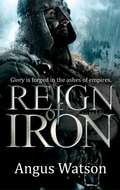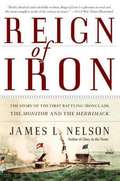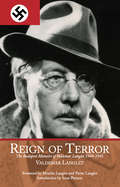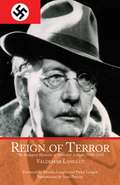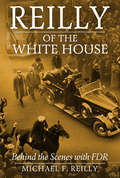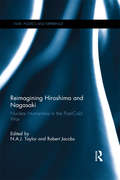- Table View
- List View
Regarding the Pain of Others
by Susan SontagHow does the spectacle of the sufferings of others (via television or newsprint) affect us? Are viewers inured--or incited--to violence by the depiction of cruelty? In Regarding the Pain of Others, Susan Sontag takes a fresh look at the representation of atrocity-from Goya's The Disasters of War to photographs of the American Civil War, lynchings of blacks in the South, and the Nazi death camps, to contemporary horrific images of Bosnia, Sierra Leone, Rwanda, Israel and Palestine, and New York City on September 11, 2001. In Regarding the Pain of Others Susan Sontag once again changes the way we think about the uses and meanings of images in our world, and offers an important reflection about how war itself is waged (and understood) in our time.
Regency Christmas Wishes: Captain Grey's Christmas Proposal\Her Christmas Temptation\Awakening His Sleeping Beauty (Harlequin Historical Ser. #Vol. 479)
by Carla Kelly Christine Merrill Janice PrestonThree Regency romance tales of festive wishes come true.Captain Grey’s Christmas Proposal by Carla KellyCaptain Grey had been fighting malarial fever in Savannah when he met Theodora Winnings. He proposed by letter—but it’s taken ten years to receive her reply. The answer was “yes!”—but is she still free to become his Christmas bride?Her Christmas Temptation by Christine MerrillFaith Strickland’s plan to marry to save her family backfires when notorious rake James Leggett sets out to break her unhappy engagement. He’ll storm her Twelfth Night celebrations and scorch her into surrender!Awakening His Sleeping Beauty by Janice PrestonLonely Diana Fleming knows handsome knights don’t really exist. But can a festive kiss from the man she loves reawaken her frozen heart?
Regime and Periphery in Northern Yemen: The Huthi Phenomenon
by Barak A. Salmoni Madeleine Wells Bryce LoidoltFor nearly six years, the government of Yemen has conducted military operations north of the capital against groups of its citizens known as "Huthis." In spite of using all means at its disposal, the government has been unable to subdue the Huthi movement. This book presents an in-depth look at the conflict in all its aspects. The authors detail the various stages of the conflict and map out its possible future trajectories.
Regimes of Twentieth-Century Germany: From Historical Consciousness to Political Action
by Marc T. VossRegimes of Twentieth-Century Germany is a concise theory of and empirical study on action consciousness as an integral dimension of historical consciousness with specific emphasis on National Socialist Germany and the German Democratic Republic.
Regina Diana: Seductress, Singer, Spy
by Vivien Newman David A. SemeraroThe Untold Story of Rgina Diana tells of the rebellious daughter of working-class French-Italian parents from a run-down area of Geneva who, trained by the most ruthless spymaster of them all, Elisabeth Schragmller (aka Fraulein Doktor), became a much-adored French caf-concert singer, a discreet and highly prized prostitute plying her trade, and a successful German Great War spy.Reginas spy operations were full of intrigue: a network spanning four countries based in the shamed city of Marseille, with her performing abilities and sexual charms allowing her to lure men from privates to generals into giving her vital information.This book is not just about Rgina, but also explodes the much-vaunted myth of Swiss neutrality. Switzerland, a nest of spies, was riven between support for Germany and France; in an extraordinary penetration of the upper echelons of Swiss society, the Swiss Army Commander-in-Chief was married to former German Chancellor Otto von Bismarks daughter.Yet exhuming Rgina from her unmarked grave involved a tantalizing journey - getting past her disavowal by both France and Switzerland, unraveling the truth behind a three-line report about a pretty Swiss singers execution and overcoming the obfuscation of French military archivists. Even her execution was fittingly exceptional. So determined were the French authorities that she should die, her firing squad numbered not the usual twelve, but twenty-five smoking rifles.
Regional Disorder: The South China Sea Disputes (Adelphi series)
by Sarah RaineChina‘s rise casts a vast and uncertain shadow over the regional balance of power in the Asia Pacific, and nowhere is this clearer than in the South China Sea. The significance of the fraught territorial disputes in this potentially resource-rich sea extends far beyond the small groupings of islands that are at their heart, and into the world of great-power politics. As the struggle for hegemony between the US and China intersects with the overlapping aspirations of emerging, smaller nations, the risk of escalation to regional conflict is real. Christian Le Mi and Sarah Raine cut through the complexities of these disputes with a clear-sighted, and much-needed, analysis of the assorted strategies deployed in support of the multiple and competing claims in the SCS. They make a compelling case that the course of these disputes will determine whether the regional order in Southeast Asia is one of cooperation, or one of competition and even conflict.
Regional Institutions, Geopolitics and Economics in the Asia-Pacific: Evolving Interests and Strategies (Asian Security Studies)
by Yoichiro Sato Steven B. Rothman Utpal VyasThis volume discusses the relationship between economics, geopolitics and regional institutional growth and development in the Asia-Pacific region. How do states (re)define their relationships amid the current global power transition? How do rival actors influence the rules and formation of new institutions for their own benefit? What role will institutions take as independent actors in influencing and constraining the behavior of states? Institutional development in Asia is characterized by idiosyncratic and diverse motivations (both material and non-material), a variety of policy strategies (strategic and norm-based), and the looming question of China’s future depth of involvement as its economic position becomes more stable and its confidence in foreign affairs grows. The book reflects the broadening definition of Asia by examining multiple perspectives, including Japan, China, South Korea, the United States, Australia, India, Russia, and Taiwan. In addition to state actors, the contributors address several important regional institutions in development such as the ASEAN (+3, +6, and the East Asian Summit), the Asian Infrastructure Investment Bank (AIIB), the Asian Development Bank (ADB), existing security alliances, and other bilateral institutions. Ultimately, this volume describes the unique, slow, and diverse growth of a multitude of regional institutions, the complexities of generating cooperation, membership concerns, and competition between states and with existing institutions in the context of China’s increasing confidence and strength. This book will be of much interest to students of Asian politics, regional security, international organizations, and foreign policy.
Regional Language Policies in France during World War II
by Aviv AmitDuring Germany's occupation of France in WWII, French regional languages became a way for people to assert their local identities. This book offers a detailed historical sociolinguistic analysis of the various language policies applied in France's regions (Brittany, Southern France, Corsica and Alsace) before, during and after WWII.
Regional Missile Defense from a Global Perspective
by Catherine Mcardle Kelleher Peter DombrowskiRegional Missile Defense from a Global Perspective explains the origins, evolution, and implications of the regional approach to missile defense that has emerged since the presidency of George H. W. Bush, and has culminated with the missile defense decisions of President Barack Obama. The Obama administration's overarching concept for American missile defense focuses on developing both a national system of limited ground-based defenses, located in Alaska and California, intended to counter limited intercontinental threats, and regionally-based missile defenses consisting of mobile ground-based technologies like the Patriot PAC-3 system, and sea-based Aegis-equipped destroyer and cruisers. The volume is intended to stimulate renewed debates in strategic studies and public policy circles over the contribution of regional and national missile defense to global security. Written from a range of perspectives by practitioners and academics, the book provides a rich source for understanding the technologies, history, diplomacy, and strategic implications of the gradual evolution of American missile defense plans. Experts and non-experts alike--whether needing to examine the offense-defense tradeoffs anew, to engage with a policy update, or to better understand the debate as it relates to a country or region--will find this book invaluable. While it opens the door to the debates, however, it does not find or offer easy solutions--because they do not exist.
Regional Security Structures in Asia
by Ashok KaporKapor argues that explanations of international relations in Asia in the post-Second World War period have relied too much on the Cold War as a key explanatory factor, and have not given enough emphasis to the useful concepts of 'regional power formation', 'conflict formation' and 'conflict resolution'. The author outlines these concepts and goes on to elaborate on them, and to apply them to three key Asian regions - northeast, southeast, and south Asia - discussing practical strategic issues in an historical perspective and arguing that these concepts, and other concepts which he discusses, are extremely helpful in making sense of the complex pattern of international relations in Asia.
Regional Security in the Middle East: Past Present and Future
by Zeev MaozMiddle Eastern politics of the 1990s have been characterized by a drive towards peace. Whether this is successful or not will depend on the negotiating process. These articles discuss the challenges, and provide some practical advice on how risks of failure could be avoided.
Regions and Development: Politics, Security and Economics (Routledge Research EADI Studies in Development #No. 23)
by Sheila PageAt the 1996 EADI Conference, the papers presented in the World Trade and Trade Policy workshop looked at the new trends in regionalism from a variety of points of view for different institutions. They considered the effects of regions, their implications for policy and performance in the developing countries and for international economic institutions, and tried to interpret them in terms of economic and political theory.
Regular Soldiers, Irregular War: Violence and Restraint in the Second Intifada
by Devorah S. ManekinWhat explains differences in soldier participation in violence during irregular war? How do ordinary men become professional wielders of force, and when does this transformation falter or fail? Regular Soldiers, Irregular War presents a theoretical framework for understanding the various forms of behavior in which soldiers engage during counterinsurgency campaigns—compliance and shirking, abuse and restraint, as well as the creation of new violent practices.Through an in-depth study of the Israeli Defense Forces' repression of the Second Palestinian Intifada of 2000–2005, including in-depth interviews with and a survey of former combatants, Devorah Manekin examines how soldiers come both to unleash and to curb violence against civilians in a counterinsurgency campaign. Manekin argues that variation in soldiers' behavior is best explained by the effectiveness of the control mechanisms put in place to ensure combatant violence reflects the strategies and preferences of military elites, primarily at the small-unit level. Furthermore, she develops and analyzes soldier participation in three categories of violence: strategic violence authorized by military elites; opportunistic or unauthorized violence; and "entrepreneurial violence"—violence initiated from below to advance organizational aims when leaders are ambiguous about what will best serve those aims. By going inside military field units and exploring their patterns of command and control, Regular Soldiers, Irregular War, sheds new light on the dynamics of violence and restraint in counterinsurgency.
Regulating Business for Peace
by Jolyon FordThis book addresses gaps in thinking and practice on how the private sector can both help and hinder the process of building peace after armed conflict. It argues that weak governance in fragile and conflict-affected societies creates a need for international authorities to regulate the social impact of business activity in these places as a special interim duty. Policymaking should seek appropriate opportunities to engage with business while harnessing its positive contributions to sustainable peace. However, scholars have not offered frameworks for what is considered 'appropriate' engagement or properly theorised techniques for how best to influence responsible business conduct. United Nations peace operations are peak symbols of international regulatory responsibilities in conflict settings, and debate continues to grow around the private sector's role in development generally. This book is the first to study how peace operations have engaged with business to influence its peace-building impact.
Regulating the Private Security Industry: Regulating The Private Security Industry (Adelphi series)
by Sarah PercyThe under-regulation of the private security industry has increasingly become a topic of media and academic interest. This Adelphi Paper enters the debate by explaining why the industry requires further regulation, and what is wrong with the current system. It begins by briefly defining the industry and explaining the need for more effective regulation, before analysing three types of regulation: domestic, international and informal (including self-regulation).
Reich: World War II Through German Eyes
by James LucasWhile Allied propaganda would have us believe that during the Second World War the German population were downtrodden workers, with no rights and totally under the power and influence of the all-controlling Gestapo, the truth is somewhat different. While the Allies saw Hitler as an evil to be removed from power, in 1933 the German people saw him as a savior, able to rescue them from the humiliation of Versailles and provide a strong leader. The German people themselves felt that they had social benefits unmatched by their neighboring states, and that its poverty had been eliminated while their economy had been stabilized. James Lucas presents fascinating insight into the real Reich, a glimpse into the life on the German home front. After many years' research and interviews with civilians and German soldiers, Lucas offers a study of the social, economic and military phenomena of the Nazi regime.
Reign of Hell
by Sven HasselA sudden curtain of silence fell over the burning city. All that could be heard was the steady crackling of flames...Hitler's penal regiments advance on Poland. Himmler has given the order: Warsaw must be razed to the ground. But the Polish Home Army are not willing to give in to the German troops so easily. As the city erupts into an inferno of flames and gunfire, Sven and his comrades find themselves caught between the sadism of the SS and the guerrilla warfare of the Polish Resistance...REIGN OF HELL is a gripping insight into the Warsaw Uprising of 1944, and the bloodshed that ensued as the Polish tried desperately to liberate themselves from the German occupation.
Reign of Hell (Sven Hassel War Classics)
by Sven HasselA sudden curtain of silence fell over the burning city. All that could be heard was the steady crackling of flames...Hitler's penal regiments advance on Poland. Himmler has given the order: Warsaw must be razed to the ground. But the Polish Home Army are not willing to give in to the German troops so easily. As the city erupts into an inferno of flames and gunfire, Sven and his comrades find themselves caught between the sadism of the SS and the guerrilla warfare of the Polish Resistance...REIGN OF HELL is a gripping insight into the Warsaw Uprising of 1944, and the bloodshed that ensued as the Polish tried desperately to liberate themselves from the German occupation.
Reign of Iron (Iron Age #3)
by Angus WatsonWARRIOR QUEENS AND ROMAN INVADERS DO BATTLE IN THE FINAL VOLUME OF THIS THRILLING EPIC FANTASY TRILOGY.Caesar's soldiers have murdered, massacred and pillaged their way through Gaul and loom on the far side of the sea, ready to descend upon Britain - with them are an unstoppable legion of men twisted by dark magic. Somehow Queen Lowa must repel the invasion, although her best general is dead and her young druid powerless. She faces impossible odds, but when the alternative is death or slavery, a warrior queen will do whatever it takes to save her people. EVERY EMPIRE HAS ITS DOWNFALL.
Reign of Iron: The Story of the First Battling Ironclads, the Monitor and the Merrimack
by James L. NelsonAt the outbreak of the Civil War, North and South quickly saw the need to develop the latest technology in naval warfare, the ironclad ship. After a year-long scramble to finish first, in a race filled with intrigue and second guessing, blundering and genius, the two ships -- the Monitor and the Merrimack -- after a four-hour battle, ended the three-thousand-year tradition of wooden men-of-war and ushered in "the reign of iron." In the first major work on the subject in thirty-five years, novelist, historian, and tall-ship sailor James L. Nelson, acclaimed author of the Brethren of the Coast trilogy, brilliantly recounts the story of these magnificent ships, the men who built and fought them, and the extraordinary battle that made them legend.
Reign of Terror: The Budapest Memoir of Valdemar Langlet
by Valdemar LangletAlthough not as well known as Raoul Wallenberg, Valdemar Langlet was the saviour of thousands of Jews in Budapest in the last two years of the Second World War.Entirely without the permission or the financial support of the Swedish Red Cross, he issued socalled Letters of Protection, passport-like documents with official-looking stamps that frequently saved Hungarian Jews from deportation to the death camps. Then, when chaos broke out in the streets when the Germans put their Arrow Cross allies in power, and the approaching Red Army threatened to turn the city into a battleground, he risked his life to shelter Jews and other refugees in safe houses throughout Budapest.A gifted linguist, Langlet was able in the early days to deal directly with Hungarian officials, who were often themselves eager to have the protection of the Swedish Red Cross emblem on their own houses as the war drew closer to the capital, and later with the Soviet commanders who took control after fierce fighting had destroyed much of Budapest.This is a unique and fascinating memoir of a man who almost without any official authority or support from his own country saved thousands of lives during one of the most terrible episodes in world history.
Reign of Terror: The Budapest Memoirs of Valdemar Langlet 1944–1945
by Valdemar LangletThe memoirs of a man who saved thousands from the Nazi death camps. Although not as well-known as Raoul Wallenberg, Valdemar Langlet was the savior of thousands of Jews in Budapest in the last two years of World War II. Entirely without the permission or the financial support of the Swedish Red Cross, he issued so-called "Letters of Protection,” which were passport-like documents with official-looking stamps that frequently saved Hungarian Jews from deportation to the death camps. Then chaos broke out in the streets and the Germans put their Arrow Cross allies in power. With the approaching Red Army threatening to turn the city into a battleground, Langlet risked his life to shelter Jews and other refugees in safe houses throughout Budapest. A gifted linguist, Langlet was able to deal directly with Hungarian officials, who were often themselves eager to have the protection of the Swedish Red Cross emblem on their own houses as the war drew closer to the capital. Later, he communicated with the Soviet commanders who took control after fierce fighting had destroyed much of Budapest. This is a unique and fascinating memoir of a man who saved thousands of lives during one of the most terrible episodes in world history without official authority or support from his own country. Skyhorse Publishing, as well as our Arcade imprint, are proud to publish a broad range of books for readers interested in history--books about World War II, the Third Reich, Hitler and his henchmen, the JFK assassination, conspiracies, the American Civil War, the American Revolution, gladiators, Vikings, ancient Rome, medieval times, the old West, and much more. While not every title we publish becomes a New York Times bestseller or a national bestseller, we are committed to books on subjects that are sometimes overlooked and to authors whose work might not otherwise find a home.
Reilly of the White House
by Michael F. ReillyA fascinating memoir by Michael Reilly about his years as the head of the White House Secret Service detail entrusted with keeping President Franklin D. Roosevelt safe during World War II. Reilly gives the inside scoop on how it was done, from borrowing Al Capone's confiscated armored car from the Treasury to move FDR about, to innovating the idea of a secret elevator inside a C-54 transport plane so the disabled President could safely move about the world without being discovered. Facing problems as ordinary as finding a way to burn confidential military dispatches in the White House furnaces without fragments drifting out of the chimneys (Reilly borrowed popcorn baskets from the kitchens), to the exotic (how do you convince the King of Saudi Arabia to come to a secret meeting with the President when the King insists he must bring along his tents, his rugs, all his relatives and his personal flock of sheep? Easy -- transport the King, his entire entourage and the sheep on the fantail of a United States destroyer), Reilly found a way to meet the extraordinary demands of keeping a war-time president safe at home and abroad.
Reilly of the White House
by Michael F. Reilly William J. SlocumReilly of the White House, first published in 1947, is Michael Reilly’s fascinating account of his tenure as head of the White House Secret Service detail for President Franklin D. Roosevelt. The book details his security and protection measures for the President, the close-calls from those attempting to harm FDR, and his worldwide travels, including meetings of Roosevelt with Churchill, Stalin, and other world leaders.From the dust jacket: Mike Reilly guarded, for four years, the number one Nazi target: FDR. This is the story of that stewardship, which ranged from buying White House groceries to standing behind a curtain with his gun trained on the middle button of a diplomat’s uniform.Reilly never left the President’s side. His protection methods had to be fast and frequently unorthodox. His behind-the-scenes story—of those methods, of the hair-trigger emergencies, of the world-famous people he met; above all, of FDR—is even faster and even more unorthodox.It was on December 7th, 1941, that Mike Reilly took over the top Secret Service spot of guarding the President. From that day on it was his business to protect the President from assassination which might come via guns, daggers, bombs, poison, fire, or the well-known blunt instrument. In order to get an armored car, for example—which the Constitution does not provide for—Mike had to borrow one from the Treasury Department. It was Al Capone’s originally and it served until one of the big automobile companies made one specially and leased it to the President for one dollar a year.
Reimagining Hiroshima and Nagasaki: Nuclear Humanities in the Post-Cold War (War, Politics and Experience)
by N.A.J. Taylor Robert JacobsThis edited volume reconsiders the importance of the attacks on Hiroshima and Nagasaki from a post-Cold War perspective. It has been argued that during the Cold War era scholarship was limited by the anxiety that authors felt about the possibility of a global thermonuclear war, and the role their scholarship could play in obstructing such an event. The new scholarship of Nuclear Humanities approaches this history and its fallout with both more nuanced and integrative inquiries, paving the way towards a deeper integration of these seminal events beyond issues of policy and ethics. This volume, therefore, offers a distinctly post-Cold War perspective on the nuclear attacks on Hiroshima and Nagasaki. The chapters collected here address the memorialization and commemoration of Hiroshima and Nagasaki by officials and states, but also ordinary people’s resentment, suffering, or forgiveness. The volume presents a variety of approaches with contributions from academics and contributions from authors who are strongly connected to the cities of Hiroshima and Nagasaki, and its people. In addition, the work branches out beyond the traditional subjects of social sciences and humanities to include contributions on art, photography, and design. This variety of approaches and perspectives provides moral and political insights on the full range of vulnerabilities – such as emotional, bodily, cognitive, and ecological – that pertains to nuclear harm. This book will be of much interest to students of critical war studies, nuclear weapons, World War II history, Asian History and International Relations in general.
